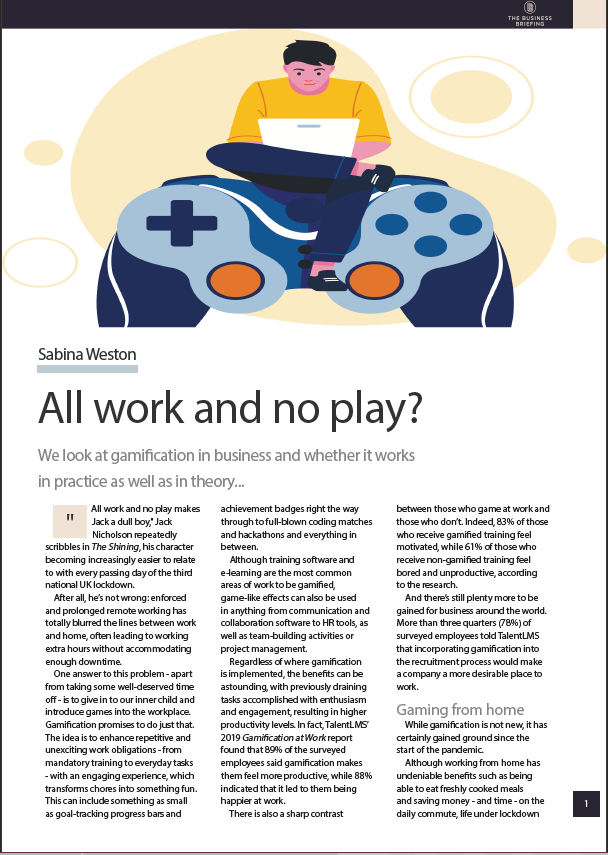75% of jobs will require advanced digital skills by 2030
Research claims recruiters will be more inclined to employ Gen Z candidates due to their tech know-how


75% of jobs will require advanced digital skills by 2030 as Gen Z becomes the most digitally-capable generation yet.
That's according to a new report on the impact of COVID-19 on Gen Z’s employment prospects, which was published by advisory firm Oxford Economics and commissioned by camera and social media company Snap.
It claims that by the end of this decade, 75% of jobs will require advanced digital skills, with employers looking for knowledge in areas such as augmented reality (AR), a market expected to see a 10-fold increase in value by 2023.
Moreover, recruiters will be more inclined to employ candidates with strong tech know-how and so-called ‘cognitive skills’ like creativity and critical thinking.
This means that Gen Z, which the report defines as those born between 1995 and 2010, will be at a greater advantage than other age groups due to the digital capabilities they have gained by growing up surrounded by technology.
In fact, despite fears that remote education caused by lockdown restrictions is hindering young people’s future prospects, the Oxford Economics report found that the pandemic is unlikely to hinder Gen Z’s earning power and long-term employment prospects.
RELATED RESOURCE

Oxford Economics director Henry Worthington said that the research “shows that we need to move away from teaching young people to accumulate knowledge, to a more well-rounded education which focuses on the application of this knowledge, creativity, and critical thinking”.
Sign up today and you will receive a free copy of our Future Focus 2025 report - the leading guidance on AI, cybersecurity and other IT challenges as per 700+ senior executives
"Simply put, in the near future workers will have to do the jobs that computers can’t. This isn’t about robots taking our jobs, it’s about making sure we train up the next generation to think and work in ways which computers can’t,” he added.
Commenting on the findings, Snap’s International VP Claire Valoti said that, despite the current challenges faced by young people, “there is a real case for optimism particularly if we can equip young people for a fast changing digital economy”.
“Technologies like Augmented Reality have the potential to permeate all aspects of society and to drive demand for a new set of creative and technical digital skills over the next decade and most promisingly for Gen Z, AR entrepreneurs highly value the soft skills inherent to Gen Z including creativity, agility and an eagerness to learn,” added Valoti.
Having only graduated from City University in 2019, Sabina has already demonstrated her abilities as a keen writer and effective journalist. Currently a content writer for Drapers, Sabina spent a number of years writing for ITPro, specialising in networking and telecommunications, as well as charting the efforts of technology companies to improve their inclusion and diversity strategies, a topic close to her heart.
Sabina has also held a number of editorial roles at Harper's Bazaar, Cube Collective, and HighClouds.
-
 Redefining resilience: Why MSP security must evolve to stay ahead
Redefining resilience: Why MSP security must evolve to stay aheadIndustry Insights Basic endpoint protection is no more, but that leads to many opportunities for MSPs...
-
 Microsoft unveils Maia 200 accelerator, claiming better performance per dollar than Amazon and Google
Microsoft unveils Maia 200 accelerator, claiming better performance per dollar than Amazon and GoogleNews The launch of Microsoft’s second-generation silicon solidifies its mission to scale AI workloads and directly control more of its infrastructure
-
 Lloyds Banking Group wants to train every employee in AI by the end of this year – here's how it plans to do it
Lloyds Banking Group wants to train every employee in AI by the end of this year – here's how it plans to do itNews The new AI Academy from Lloyds Banking Group looks to upskill staff, drive AI use, and improve customer service
-
 Want to keep your job in the AI era? Start retraining now
Want to keep your job in the AI era? Start retraining nowNews Workers face critical decisions over the best way to upskill and retrain in the age of AI
-
 Cisco promises AI training for a million Americans
Cisco promises AI training for a million AmericansNews The company joins Amazon, Google, and Microsoft in support of the government's Pledge to America's Youth – Investing in AI Education
-
 Women show more team spirit when it comes to cybersecurity, yet they're still missing out on opportunities
Women show more team spirit when it comes to cybersecurity, yet they're still missing out on opportunitiesNews While they're more likely to believe that responsibility should be shared, women are less likely to get the necessary training
-
 Employees want purpose, and they’re willing to quit to find it – upskilling, career growth, and work-life balance have shifted priorities for workers
Employees want purpose, and they’re willing to quit to find it – upskilling, career growth, and work-life balance have shifted priorities for workersNews Employees want purpose and meaning at work — and if they don't get it, two thirds would quit to find it.
-
 DEI rollbacks could exacerbate tech talent shortages – nearly half of recruitment leaders worry diversity cuts will impact their company’s appeal and employee retention
DEI rollbacks could exacerbate tech talent shortages – nearly half of recruitment leaders worry diversity cuts will impact their company’s appeal and employee retentionNews Finding talent with AI skills has already become a major challenge for enterprises, but with some enterprises shelving DEI hiring practices, research suggests the situation could get worse.
-
 Tech firms eye temps to plug talent gaps
Tech firms eye temps to plug talent gapsNews The tech industry could be set for a spike in temporary hiring, according to a new study from recruitment firm Robert Walters.
-
 IDC InfoBrief: Sustainability doesn’t need to be all stick and no carrot
IDC InfoBrief: Sustainability doesn’t need to be all stick and no carrotwhitepaper CIOs are facing two conflicting strategic imperatives
